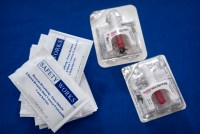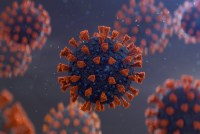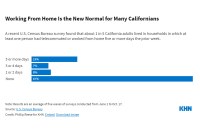Latest KFF Health News Stories
Dads Drive Growth in California’s Paid Family Leave Program
The number of men in the state taking paid family leave to bond with a new child has risen nearly 20% since the start of the pandemic.
Narcan, Now Available Without a Prescription, Can Still Be Hard to Get
Narcan is available without a prescription. Addiction treatment experts hope this move will increase access to the medication, which can reverse opioid overdoses. But hurdles remain: cost and stigma.
A New Medicare Proposal Would Cover Training for Family Caregivers
The federal government is proposing having Medicare pay professionals to train family caregivers how to perform tasks like bathing and dressing their loved ones, and properly use medical equipment.
Los líderes legislativos habían presionado a Newsom, también demócrata, para que canalizara los ingresos fiscales hacia la reducción de los costos de la atención sanitaria.
Covered California to Cut Patient Costs After Democratic Lawmakers Win Funding From Gov. Newsom
California’s health insurance exchange will reduce how much some patients pay for care next year, including hospital deductibles, appointment copays, and prescription drugs. Lawmakers pressed Gov. Gavin Newsom to make good on a four-year-old pledge to use proceeds from a tax penalty on uninsured people to help people pay for treatment.
Hospitals Ask Congress to Delay ACA Medicaid Funding Cuts — For the 14th Time
Congress has until October to avert cuts to a Medicaid program intended to support safety-net hospitals that, in practice, improves the bottom lines of other hospitals, too. Hospital leaders say now is not a good time for the cuts — which lawmakers have so far postponed 13 times.
Meet the People Deciding How to Spend $50 Billion in Opioid Settlement Cash
As settlement dollars land at the state level, state councils wield significant power in determining how the windfall gets spent. And, though they will likely include the most knowledgeable voices on addiction, these panels also face concerns about conflicts of interest and other issues.
Marihuana legal es más potente que nunca pero no está bien regulada
Cientos de miles de personas llegan a salas de emergencias por crisis relacionadas con la marihuana, y millones sufren trastornos psicológicos vinculados al consumo de cannabis, según investigaciones federales.
Legal Pot Is More Potent Than Ever — And Still Largely Unregulated
As marijuana has become far more mainstream, potent, and sometimes dangerous, uneven regulation at the state and federal levels leaves consumers at risk.
How to Grow Your Social Network as You Age
As your circle of close friends shrinks, there are ways to rebuild — but not replace — the social network you had when you were younger.
As Federal Emergency Declaration Expires, the Picture of the Pandemic Grows Fuzzier
The pandemic gave federal officials expanded power to access crucial data about the spread of covid-19, but that authority will change when the public health emergency sunsets in May. That, along with the end of popular covid trackers, will make it harder for policymakers and the public to keep an eye on covid and other threats.
Redes sociales alimentan obsesión por las drogas para bajar de peso, sin hablar de riesgos
La competencia para hacerse con un mercado que podría valer $100.000 millones al año, solo para los fabricantes de medicamentos, ha desencadenado una ola de publicidad que preocupa a las autoridades sanitarias y médicos de todo el mundo.
Social Media Is Fueling Enthusiasm for New Weight Loss Drugs. Are Regulators Watching?
Online platforms are overflowing with testimonials for GLP-1s. The drugs show promise for inducing weight loss, but many aren’t FDA-approved for that use.
A Smart Move on Tax Day: Get Health Insurance Information Using Your State’s Tax Forms
A growing number of states — including Maryland, Colorado, and Massachusetts — are using tax forms to point people toward lower-cost health coverage available through state insurance marketplaces.
After Capping Insulin Copays, Colorado Sets Its Sights on EpiPens
Colorado’s proposed legislation to cap the copay for the EpiPen is part of a nationwide trend as more states try to shield patients from skyrocketing drug prices.
Ante vacío federal, estados promueven leyes duras contra el uso de sustancias tóxicas en cosméticos
Las hispanas y asiáticas han informado que usan más cosméticos en general que las mujeres negras y blancas no hispanas.
States Seek Crackdown on Toxic Ingredients in Cosmetics to Close Gaps in Federal Oversight
Washington state regulators found formaldehyde, lead, and arsenic in lipstick, powder foundations, skin lotions, and hair products marketed to and popular with women of color. Now legislators there are seeking to ban the products and, like at least a dozen other states, make up for lax federal rules.
Abortion Debate Ramps Up in States as Congress Deadlocks
Abortion is a top issue for state lawmakers meeting for their first full sessions since Roe v. Wade was overturned.
Employers Use Patient Assistance Programs to Offset Their Own Costs
Some insurers and employers are tapping into assistance programs meant for individual patients. The concern: Some costly drugs could be harder for patients to access.
A Work-From-Home Culture Takes Root in California
New U.S. Census Bureau data shows a large segment of Californians are working from home for part or all of the week. Researchers say the shift will ripple through the broader economy in ways big and small.






















